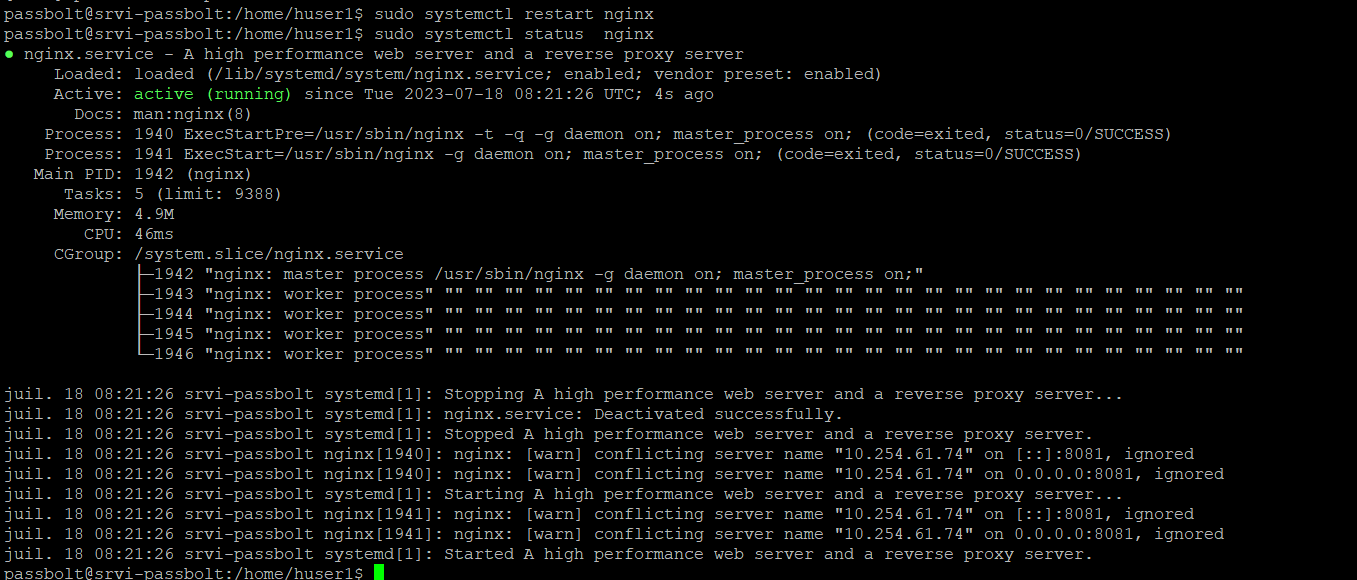Hello every one,
Here are some informations :
OS: Ubuntu 22.04
PHP: 8.1.2
nginx : 1.18.0
passbolt: 4.1.1
Actually, I have some probleme when I try to browse to the server from my navig, I couldn’t access, also it give me apache page but I’m using nginx after removing apache2 and I tried hard to know the source of the problem, but I couldn’t understand.
Also when the installation is done: it give me that link to access but it doesn’t work (https://10.******/setup/start/984345Yh74-4d1b-45ad-7284-fb47647208519/d376f444-6ed6-4dce-a42f-7505c72e)
And this the healthchek result:
sudo su -s /bin/bash -c “/var/www/passbolt/bin/cake passbolt healthcheck” www-data
____ __ ____ / __ \____ _____ ____/ /_ ____ / / /_/ // / __ `/ / / __ / __ / / _/
/ / // ( | ) // / // / / /
// _,///./_//__/Open source password manager for teams
Healthcheck shell
Environment
[PASS] PHP version 8.1.2-1ubuntu2.13.
[PASS] PCRE compiled with unicode support.
[PASS] The temporary directory and its content are writable and not executable.
[PASS] The logs directory and its content are writable.
[PASS] GD or Imagick extension is installed.
[PASS] Intl extension is installed.
[PASS] Mbstring extension is installed.Config files
[PASS] The application config file is present
[PASS] The passbolt config file is presentCore config
[PASS] Debug mode is off.
[PASS] Cache is working.
[PASS] Unique value set for security.salt
[PASS] Full base url is set to https://10.254.61.74
[PASS] App.fullBaseUrl validation OK.
[FAIL] Could not reach the /healthcheck/status with the url specified in App.fullBaseUrl
[HELP] Check that the domain name is correct in /var/www/passbolt/config/passbolt.php
[HELP] Check the network settingsSSL Certificate
[FAIL] SSL peer certificate does not validate
[FAIL] Hostname does not match when validating certificates.
[WARN] Using a self-signed certificate
[HELP] Check Passbolt Help | Troubleshoot SSL
[HELP] cURL Error (7) Failed to connect to 10.254.61.74 port 443 after 0 ms: Connection refusedDatabase
[PASS] The application is able to connect to the database
[PASS] 32 tables found
[PASS] Some default content is present
[PASS] The database schema up to date.GPG Configuration
[PASS] PHP GPG Module is installed and loaded.
[PASS] The environment variable GNUPGHOME is set to /var/www/.gnupg.
[PASS] The directory /var/www/.gnupg containing the keyring is writable by the webserver user.
[PASS] The server OpenPGP key is not the default one
[PASS] The public key file is defined in /var/www/passbolt/config/passbolt.php and readable.
[PASS] The private key file is defined in /var/www/passbolt/config/passbolt.php and readable.
[PASS] The server key fingerprint matches the one defined in /var/www/passbolt/config/passbolt.php.
[PASS] The server public key defined in the /var/www/passbolt/config/passbolt.php (or environment variables) is in the keyring.
[PASS] There is a valid email id defined for the server key.
[PASS] The public key can be used to encrypt a message.
[PASS] The private key can be used to sign a message.
[PASS] The public and private keys can be used to encrypt and sign a message.
[PASS] The private key can be used to decrypt a message.
[PASS] The private key can be used to decrypt and verify a message.
[PASS] The public key can be used to verify a signature.
[PASS] The server public key format is Gopengpg compatible.
[PASS] The server private key format is Gopengpg compatible.Application configuration
[PASS] Using latest passbolt version (4.1.1).
[PASS] Passbolt is configured to force SSL use.
[PASS] App.fullBaseUrl is set to HTTPS.
[PASS] Selenium API endpoints are disabled.
[PASS] Search engine robots are told not to index content.
[INFO] The Self Registration plugin is enabled.
[INFO] Registration is closed, only administrators can add users.
[PASS] The deprecated self registration public setting was not found in /var/www/passbolt/config/passbolt.php.
[WARN] Host availability checking is disabled.
[HELP] Make sure this instance is not publicly available on the internet.
[HELP] Or set the PASSBOLT_EMAIL_VALIDATE_MX environment variable to true.
[HELP] Or set passbolt.email.validate.mx to true in /var/www/passbolt/config/passbolt.php.
[PASS] Serving the compiled version of the javascript app.
[WARN] Some email notifications are disabled by the administrator.JWT Authentication
[PASS] The JWT Authentication plugin is enabled
[PASS] The /var/www/passbolt/config/jwt/ directory is not writable.
[PASS] A valid JWT key pair was foundSMTP Settings
[PASS] The SMTP Settings plugin is enabled.
[PASS] SMTP Settings coherent. You may send a test email to validate them.
[WARN] The SMTP Settings source is: /var/www/passbolt/config/passbolt.php.
[HELP] It is recommended to set the SMTP Settings in the database through the administration section.
[WARN] The SMTP Settings plugin endpoints are enabled.
[HELP] It is recommended to disable the plugin endpoints.
[HELP] Set the PASSBOLT_SECURITY_SMTP_SETTINGS_ENDPOINTS_DISABLED environment variable to true.
[HELP] Or set passbolt.security.smtpSettings.endpointsDisabled to true in /var/www/passbolt/config/passbolt.php.[FAIL] 3 error(s) found. Hang in there!
I’m waiting for the help.
Thank you



